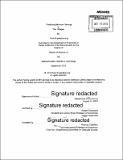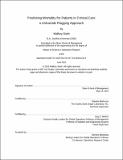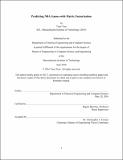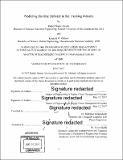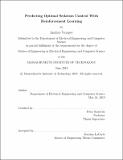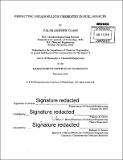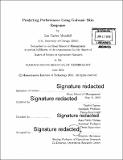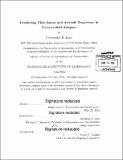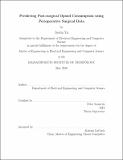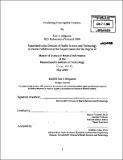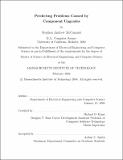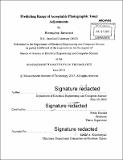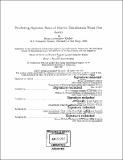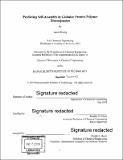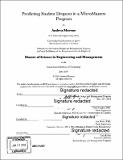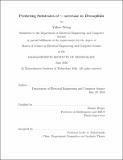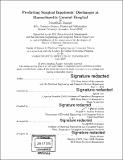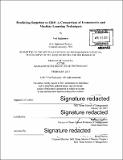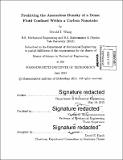Browsing MIT Libraries by Title
Now showing items 44362-44381 of 61744
-
Predicting minimum savings in Thai villages
(Massachusetts Institute of Technology, 2015)Amador Werning Angeletos (2006) characterize the conditions under which optimal saving/ consumption decision are determined by a minimum savings policy. I test this model empirically against data from the Townsend Thai ... -
Predicting mortality for patients in critical care : a univariate flagging approach
(Massachusetts Institute of Technology, 2015)Predicting outcomes for critically ill patients is a topic of considerable interest. The most widely used models utilize data from early in a patient's stay to predict risk of death. While research has shown that use of ... -
Predicting NBA games with matrix factorization
(Massachusetts Institute of Technology, 2016)In my thesis, I present the methods I use to predict NBA games using matrix factorization. Matrix factorization is popular through the Netflix recommendation problem, but in general, one can apply it to data that are best ... -
Predicting on-time delivery in the trucking industry
(Massachusetts Institute of Technology, 2017)On-time delivery is a key metric in the trucking segment of the transportation industry. If on-time delivery can be predicted, more effective resource allocation can be achieved. This research focuses on building a predictive ... -
Predicting optimal sedation control with reinforcement learning
(Massachusetts Institute of Technology, 2019)Administering sedation to patients to avoid underdosing and overdosing is an important clinical task that remains hard to control due to lack of precision in current methods of measuring sedation. The type of drugs ... -
Predicting organosulfur chemistry in fuel sources
(Massachusetts Institute of Technology, 2015)Desulfurization of fossil fuels with supercritical water (SCW) has been the topic of many studies over the past few decades. This process does not require the use of any catalyst, eliminates the need for a hydrogen feed, ... -
Predicting performance using galvanic skin response
(Massachusetts Institute of Technology, 2016)The rapid growth of the availability of wearable biosensors has created the opportunity for using physiological signals to measure worker performance. An important question is how to use such signals to not just measure, ... -
Predicting pilot intent and aircraft trajectory in uncontrolled airspace
(Massachusetts Institute of Technology, 2014)The ability to predict the likely trajectory is a key element of safely integrating Unmanned Aerial Systems (UAS) in the National Airspace System (NAS). A particularly challenging environment is in the vicinity of uncontrolled ... -
Predicting post-surgical opioid consumption using perioperative surgical data
(Massachusetts Institute of Technology, 2020)Improper consumption of prescription opioids is a massive public health issue in the United States currently. Here, we propose one approach of tackling this issue through using machine learning techniques to predict opioid ... -
Predicting prescription patterns
(Massachusetts Institute of Technology, 2008)Electronic prescription software is replacing traditional handwritten medication orders. This development however doesn't come without a cost and speed has been one of the most complained about issues. It is important to ... -
Predicting problems caused by component upgrades
(Massachusetts Institute of Technology, 2004)This thesis presents a new, automatic technique to assess whether replacing a component of a software system by a purportedly compatible component may change the behavior of the system. The technique operates before ... -
Predicting range of acceptable photographic tonal adjustments
(Massachusetts Institute of Technology, 2015)There is often more than one way to select tonal adjustment for a photograph, and different individuals may prefer different adjustments. However, selecting good adjustments is challenging. This thesis describes a method ... -
Predicting rejection rates of electric distribution wood pole assets
(Massachusetts Institute of Technology, 2017)Pacific Gas & Electric Companys (PG&E) electric distribution system includes approximately 2.4 million wood utility poles. The Pole Test & Treat (PTT) program at PG&E is responsible for inspecting these poles, prolonging ... -
Predicting self-assembly in globular protein-polymer bioconjugates
(Massachusetts Institute of Technology, 2018)Globular proteins offer powerful solutions for addressing challenges in the fields of medicine, industry, defense, and energy. Enzymes perform reactions with high efficiency and specificity, allowing for minimal generation ... -
Predicting solder defects in printed circuit board assembly (PCBA) process
(Massachusetts Institute of Technology, 2019)Printed circuit boards (PCBs) are core components of virtually every modern electronic device, from smartphones to servers. Accordingly, printed circuit board assembly (PCBA) has become core to Flex, a leading electronics ... -
Predicting student dropout in a MicroMasters program
(Massachusetts Institute of Technology, 2019)Massive Open Online Courses (MOOC) became popular in 2012. Today, MOOCs have evolved from single courses to programs that consist of a series of courses, and one or more proctored exams. Once completed, these programs open ... -
Predicting Substrates of [gamma]-secretase in Drosophila/
(Massachusetts Institute of Technology, 2016)In this thesis, I designed a computational method for predicting substrates of [gamma]-secretase in Drosophila and compared this method with other popular methods using some benchmark data set. Results show our method ... -
Predicting surgical inpatients' discharges at Massachusetts General Hospital
(Massachusetts Institute of Technology, 2018)In the last few years, MGH has grappled with severe bed capacity management problems. As a result, delays occur in delivering the patient to the right bed at the right time, hindering patient care. One of the root causes ... -
Predicting surprises to GDP : a comparison of econometric and machine learning techniques
(Massachusetts Institute of Technology, 2017)This study takes its inspiration from the practice of nowcasting, which involves making short horizon forecasts of specific data items, typically GDP growth in the context of economics. We alter this approach by targeting ... -
Predicting the anomalous density of a dense fluid confined within a carbon nanotube
(Massachusetts Institute of Technology, 2015)The equilibrium density of fluids under nanoconfinement can differ substantially from their bulk density. Using a mean-field approach to describe the energetic landscape near the carbon nanotube (CNT) wall, we obtain ...

